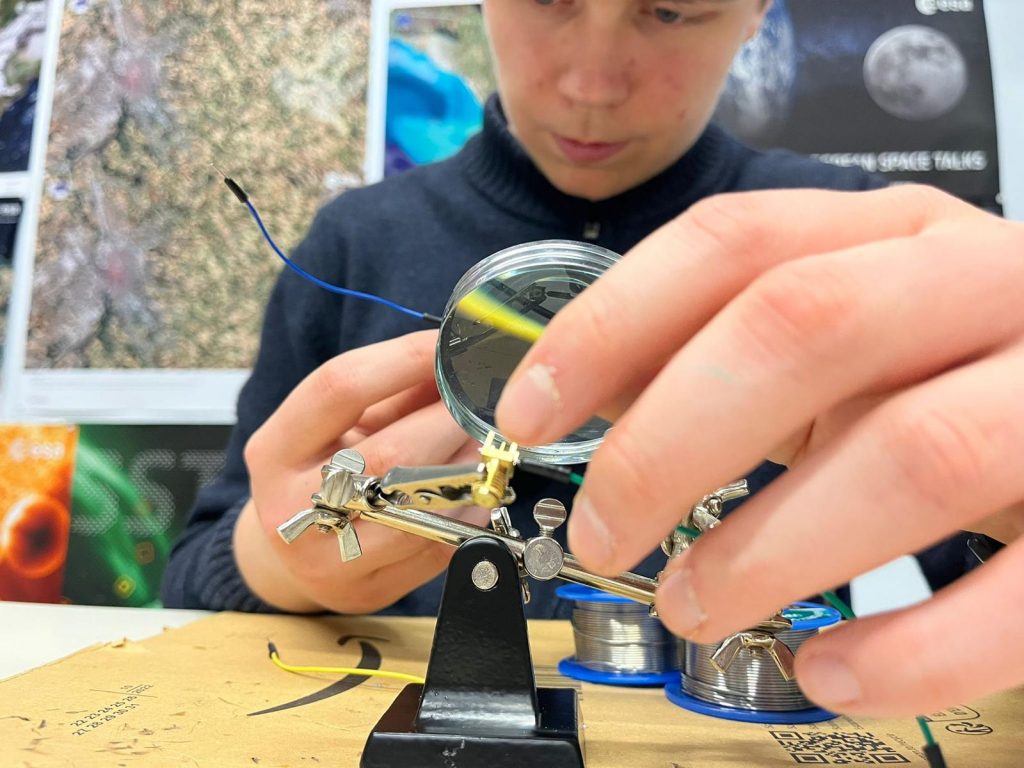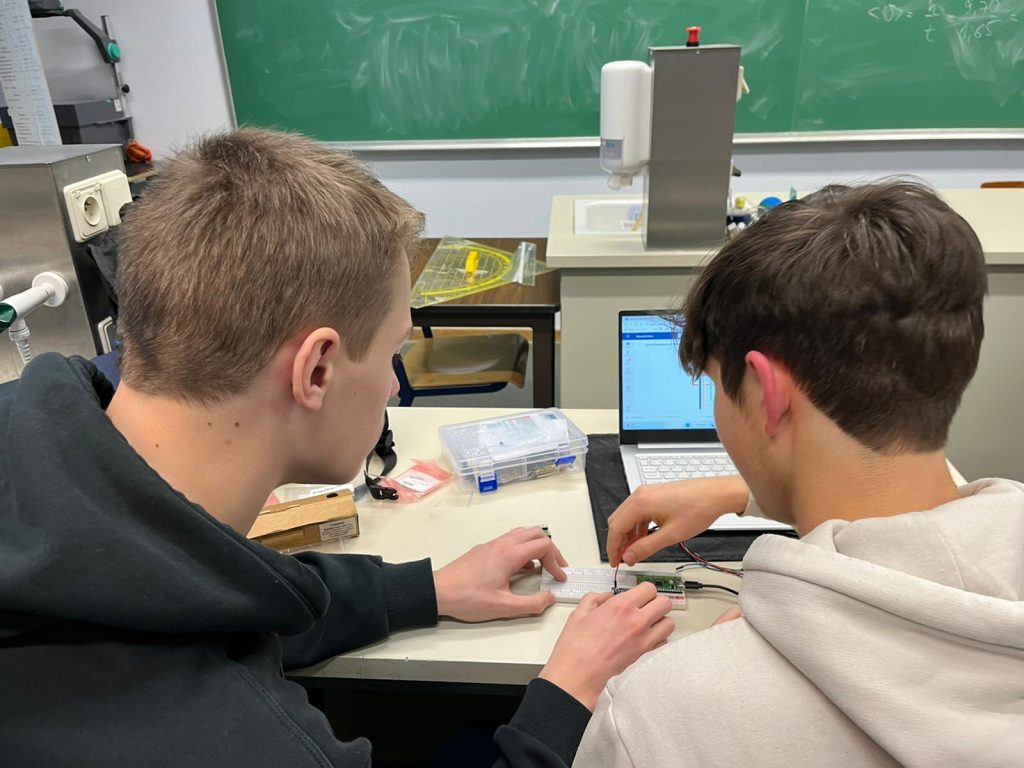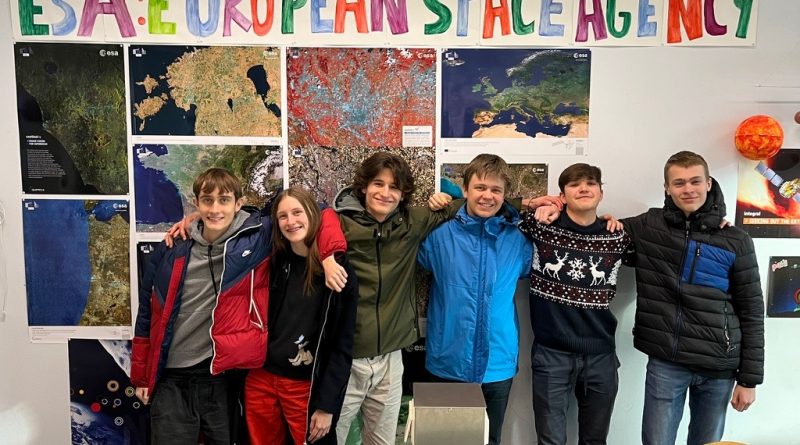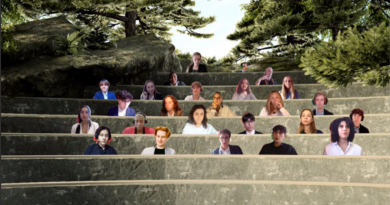Who’s hiding behind the international cansat.świerszcz project?
From the description uploaded on their Instagram:
“eeb1, 6 students, 2 teachers, 1 goal, win”
one can grasp little, the audience is left wondering. The group makes great use of a literary device, leaving loads of space to the imagination. Questions begin to arise. What students? What goal? What CanSat project?

The word CanSat offers insight. It can split into can and sat. The first one a synonym for tin, the second an abbreviation for Satellite. Curious pairing.
The word project, directs our train of thought. Suggests a challenge. Cramming all major subsystems of a satellite into the minimal volume of a can? Sounds like enough of a challenge.
One puzzle piece is still missing. Something’s askew, feels incomplete. Ambitious projects are pulled towards competition. This ever-present element that plays off of human nature. Or contrarily, fuels it. Propels forwards teams around the globe dedicated to launching a rocket and landing it safely.
Today, Maks, Maciek, Filip, Piotr, (Jakub) and Paulina, the brains and heart behind the cansat.świerszcz project open their door to us.
English version (translated by Laura from polish) (Polish version available on the site as well)
CANSAT INTERVIEW
LAURA: Hi, let’s start with a more technical question. How did the process of dividing the workload look like for you? Did it come to you straightaway, who should be in charge of what?
PAULINA: Can you see those Christmas trees at the back? We met up one evening during which we soldered these together and saw that Max got the hang of it easily. Also, he liked it a lot.
MAKS: Later on, I did a harder soldering kit. I was really happy with the results and grew to like the activity.
PIOTR: When it comes to our roles that’s how it all started. Only then did we split up the remaining tasks.
FILIP: Our initial plan underwent many, many changes.
LAURA: So I assume that no rivalries nor competition were involved…
PIOTR: Would you have actually preferred if they were?

LAURA: Of course not! I’m just saying that dramas do make for a great headline. Moving on, with duties all assigned, are you able to assess how deep into the project you are right now?
MACIEK: 30%
PIOTR: No, maybe 25%
MAKS: On the CanSat site there was a list and if we were to look at it..
PIOTR: Yes, we have two “missions” to complete and we’re around one half/ one third of our way into the first one. We have time until January for the first one, that’s when we’ll have to hand in a report.
PAULINA: The 13th
PIOTR: Hopefully we’ll be done with it by then.
LAURA: Hence, you’ll be working on it during Christmas…
PIOTR: Well, of course
PAULINA: Mhm, yes… Sewing up the parachute yuhu!
LAURA: And going back to all of those CanSat stages that you’ve just mentioned; how many are there exactly?
PIOTR: So just now there’s been the getting in process. We did get in!
PAULINA: It took place in November, it was our first deadline.
(Supportive clapping)
PIOTR: So that was really great, then in January there’s that previously mentioned report, after which many teams get eliminated. We will make it through!
LAURA: You guys’ve got this.
PIOTR: After the second report, there’s only about 6 to 8 teams left. They all qualify for the (in our case Belgian) national level competition. The winner automatically gets into the last stretch of the competition: ESA. (European Space Agency)
LAURA: And it’s hosted…
PIOTR: Where, I’m not sure. It’s during the summer though.
PAULINA: Summer!?
MACIEK: Well yes
PIOTR: One could go as far as to say the competition lasts the whole year.
MACIEK: Yup something like that… then there’s ESA where many different countries await us.

MAKS: Ironically, this means we will be competing against a polish team…
MACIEK: Yup, that’s it
LAURA: At first, I actually thought you’ve entered the polish competition, because of the word “świerszcz” in your name.
PAULINA: Why the name? Don’t ask us this question, as I can already tell you the answer: because.
PIOTR: No but actually it’s been deliberately chosen to make the French’s lives harder.
PAULINA: Ms. Rybałtowska (The coordinating teachers, together with Arnaud Jutier) came up with this idea.
PIOTR: It was all about the difficulty of the word.
(Footnote: There’s an ongoing joke in the polish culture when it comes to the word “świerszcz”, because of how taxing it is to pronounce for foreigners, natives even.
MACIEK: In truth, we missed the CanSat deadline for the polish competition, hence the Belgian one.
LAURA: I bet your amazing project will prove to be enough of a challenge for them. Speaking of, can you tell me more about its end results? How does sending this racket into the air actually look like?
MAKS: It takes place in a military polygon. There will be a racket, open to the public, which aim is to elevate all those CanSats 1km into the air. It will all be performed by specialists.
MACIEK: Upon reaching the highest designated point in the air, the CanSats will be released to measure what they have to measure. We will then collect that data, thanks to Piotrek’s antenna, and analyse it.
PIOTREK: We will put it up on our final presentation for the jury.
LAURA: It sounds like the easy part after the rocket building…
MACIEK: We’ll have to wait and see
MAKS: We have to get lucky, because the CanSat must be visible in the air for all of it to work out as planned.

LAURA: Noted… and then who will be taking the victorious can home?
- We’ll see
- Probably Ms. Rybałtowska…
- Yeah…. probably
- That’s our prediction…
LAURA: Okay then! Let us move on then to the more individual questions. What was one unanticipated obstacle each of you has encountered (while completing your tasks)?
PAULINA: Firstly, I underestimated how time-consuming managing an Instagram account can be. To spend 5 hours crafting one post? Plus, I can’t write reports. I mean it’s better now, I’ll be able to do it. Sewing together a parachute though, that’s a whole new different story.
MAKS: We haven’t even started…
(But after the team figures out the exact measurements everything should go smoothly)
MAKS: Recently, I was soldering a small computer to a metal base with only a small tip at my disposal. Maybe even too small so I had difficulty with directing the molten tin exactly where and how I wanted. So that it didn’t overflow nor obstruct any other elements. I succeeded in the end, but everything was in a such small scale…
LAURA: Does this mean you need protective equipment, even if handling tiny elements?
MAKS: Not necessarily if you’re careful.
MACIEK: If anything, protective gloves.
LAURA: What about your struggle?
MACIEK: I am responsible for calculating the parachute’s parameters, thanks to which the can will fall down safely. We are not allowed to purchase one, we have to build it from scratch. Hence, I am building a calculator which will process any variables you enter. It turns out though, that this was the easy part. The hard part is the actual encoding of the sensors attached to the can. Even though we won’t have many, we need to make sure that those we do work properly. We are slowly working our way through it with Filip. The only issue, is that we don’t have it physically, a minicomputer which will hold all of this. Making it hard to simulate. We do have a simulator, though of questionable quality. So it came to me, why shouldn’t I just buy it, that way everything is more convenient and beneficial too.
LAURA: You do have a solution, that’s what counts most!
FILIP: For me, the biggest obstacle is my lack of exposure to coding itself.
MACIEK: Same here!
FILIP: What I mean is we’ve resulted to the try until you succeed rule.
MACIEK: That’s all we can do.
FILIP: This leads to us sometimes sitting there, up to an hour, powerless.
LAURA: In those situations, can Ms. Rybałtowska or Mr. Arnaud Jutier offer you any help?
MAKS: Yes, they’re very supportive. Mr. Arnaud Jutier teaches an extracurricular electronics class.
LAURA: That’s really great. Ending with Piotrek then…
PIOTR: Well I get this task: build an antenna. I have no knowledge on it whatsoever. First, it takes time before I research it, watch videos on it and retain what I’ve learned. Second, I still have to acquire the elements and modify them accordingly to even build the antenna. I do not own in my house any saws that would allow me to do my job accurately. Thus, I use hardly working drills and hacksaws… It goes how it goes. It isn’t easy, especially when you don’t really possess the exact parameters of what you’re building.
LAURA: Valid, I wouldn’t expect you to just have a power saw at home. But then, you were saying how much of your time this project consumes. Would you also go as far as to call it a weight, maybe somewhat of a burden? Are there moments in which you feel this way?
PIOTR: Nahh… it’s worth it. Especially when taken into account the time spent and how far this can take us… to ESA! By meeting up only once a week…
THE REST:
- Twice
- Thrice even…
PIOTR: Don’t tell me we’ve reached thrice… let’s keep it real… Anyways, you’re building something and that kind of experience is irreplaceable.
LAURA: I was hoping this would be your answer. Last question? What piece of advice would you give to newcomers?
MAKS: Act quick, swift
PIOTR: Come up with a solid second mission, so that it’s realistic yet not too common nor plain.
LAURA: What’s your second mission actually?
- Ours is…
- Can we even say?
- Ms. Rybałtowska said…
- Anyhow, let’s keep it as a surprise for later
MACIEK: What’s also important is the first mission, where you’ll have to measure the temperature and air pressure. You need to focus on that. Ascertain that it works well.
FILIP: A knowledgeable teacher comes in useful.
PIOTR: Find yourself a teacher, that has that required knowledge just like our teachers.
MAKS: And a great team! Ensure that you have the time for this undertaking. Don’t feel discouraged by momentary frustrations.
PIOTR: Good one! Even when something isn’t working, you have to try. Even when you don’t know a thing about antennas, try and build something. You never know, maybe it’ll work out. It’s just a first prototype.
LAURA: I assume that you guys yourselves have tackled similar problems and doubts upon starting?
PIOTR: We had a week to come to a decision if we want to do this or not. We’ve only heard about it a week before the deadline. Meaning we had a week to figure out our project.
MACIEK: What was easiest is now behind us, roll in the hard part!
MAKS: Personally, before CanSat I was worried about the fact that none of us has really had any advanced classes in programing/electronics. We don’t know that type of stuff, we’re beginners.
MACIEK: We learn from experience, as… once said
- Yes?
- Which one?
- Come on tell us, make Mrs. Laskowska proud…
MACIEK: How a well-known philosopher once said… we all know who…
- Hume!!
Laura Debska / S6PLA / EEB1 Uccle




